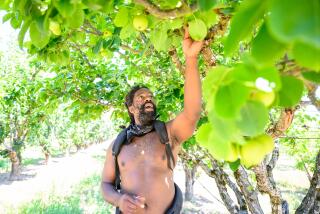Just try to see things the pig’s way
- Share via
DOES the titular sus domesticus -- a free-foraging, ocean-bathing sow much treasured by her suburban Auckland neighborhood -- “sing” in the human sense? And if so, is she consciously serenading the moon? These are only two of countless questions about animals’ subjective lives that arise then are mostly left open to speculation in “The Pig Who Sang to the Moon: The Emotional World of Farm Animals.”
Popular author Jeffrey Moussaieff Masson, however, harbors no doubt regarding this or just about any other intimation that “owned” animals ranging from chickens to cows possess the full (perhaps even a fuller) range of human emotions. Of the New Zealand sow’s vocalizing, he declares, Piglet’s “sweetest sounds during a night of the full moon [provide] another reason to believe that many animals
In species-by-species chapters -- devoted to ducks, sheep and goats in addition to the creatures mentioned above -- Masson makes an impassioned case for barnyard animals’ capacity to suffer as exquisitely as any human being. Sticking to the formula of his previous bestselling books on animal emotions, he argues mainly by anecdotal accumulation. Though science is sometimes brought in (ethologist Konrad Lorenz is OK though limited, behaviorist B.F. Skinner anathema) and Masson’s useful index suggests he has done much spadework, the reader mostly is taken to farms and sanctuaries to witness striking examples of nonhuman joy, love, friendship and generosity, but also fear and anguish.
Some of the most intriguing accounts here are taken from long-ago observers, including Leonardo da Vinci (a vegetarian!) and Aristotle. Most, however, come from present-day, well-off protectors of abused and rescued animals. Not surprisingly, the juxtaposed descriptions of current mass farming and slaughter practices, as well as eye-opening details on automated milk collection and the “harvesting” of down for our bedding and ski-parkas, invite serious soul searching. By the concluding chapter, “On Not Eating Friends,” Masson is likely to have most readers eating out of his (almost) vegan hand. At least until visceral memory fades, and convenient rationalization takes over.
Masson, whose list of titles includes “The Nine Emotional Lives of Cats,” appears to be blessed with multiple, rather dazzling lives -- if not emotionally, then professionally. His early publications were poetry translations (he holds a Harvard doctorate in Sanskrit). After training as a psychoanalyst in Toronto, Masson challenged Freudian theory in a volley of books, a phase that culminated in his highly publicized lawsuit against journalist Janet Malcolm, who had chronicled his attempt to take over directorship of the Sigmund Freud archives.
For all the admiring, anthropomorphic (his term) views he holds on animals, Masson historically hasn’t suffered human critics lightly. And a whiff of authorial condescension runs through “The Pig Who Sang to the Moon” as well: Masson cites generally known and accepted facts (such as the high intelligence of pigs, or the interspecies bonds many animals form) with the finger-wagging tone of someone correcting rampant public ignorance. Masson’s rhetorical devices include a profusion of “it seems likely,” “there is no question” and similar phrases meant to nudge debatable opinion toward certainty.
Why quibble, given the blessing of a book that on the whole steers toward humanist and ecological enlightenment? Masson is a standard bearer for a modern empirical and philosophical crusade that reaches from the 1980s bestseller “Diet for a Small Planet” through bioethicist Peter Singer and this year’s Nobelist in literature, J.M. Coetzee. Having raised public awareness through less confrontational works on pets and wild creatures, he now moves in for the kill, so to speak, touching the public where it lives: in its stomach. Coincidentally, the discovery of mad cow disease in one Washington state animal has resulted in the precautionary slaughter and destruction of a herd of 449 calves. What could more sharply illustrate the long-term danger posed by callous, profit-driven farming practices to human health?
In closing, Masson exhorts his readers to just say no to all animal farming, to embrace veganism, Polartec and so-called dairy products of soy, noting that such “cheese ... improves every year.” Nice, if you can afford it. But Masson’s leap to a world purified of farm animals seems rather too smooth. Where is the reality of the hands-on farmer, balancing livelihood, responsibility and inevitable mortality? What of the millions of peasants worldwide whose wealth and pride lie in a few chickens they’ve spared their own grain for? If animal husbandry is irredeemably evil, why do many conservationists and naturalists value the diversity of the family farm and work to preserve it? He refers to his position as “radical.” Some might respond that he is neither radical nor rigorous enough.
More to Read
Sign up for our Book Club newsletter
Get the latest news, events and more from the Los Angeles Times Book Club, and help us get L.A. reading and talking.
You may occasionally receive promotional content from the Los Angeles Times.








